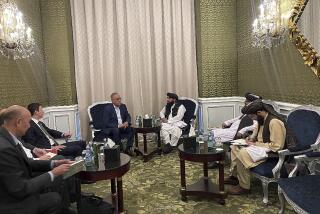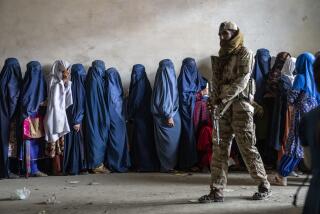U.S. Official Calls for Less Security at Women’s Forum : China: Undersecretary of State Wirth warns that Beijing’s intrusiveness will hinder free discussion. He urges U.N. to intervene.
- Share via
BEIJING — A senior U.S. official warned Saturday that extensive Chinese security precautions threaten to disrupt free discussion at the U.N. Fourth World Conference on Women, set to open here Monday with thousands of delegates from around the world, including First Lady Hillary Rodham Clinton.
Alarmed by the presence of several hundred Chinese security agents inside the meeting site at Beijing’s Asian Games Village, U.S. Undersecretary of State for Global Affairs Timothy Wirth called on U.N. sponsors to pressure the Chinese government to reduce security at the conference, which will focus on vital issues of health, human rights and equality for women.
In an apparent attempt to prevent public debate from spilling into the muted streets of the Chinese capital, officials have blocked traffic and cordoned off the meeting site on all sides. Wirth said the elaborate security far exceeds that for previous conferences and violates U.N. agreements providing for political sanctuary on the meeting grounds.
“They are incurring an awful lot of frustration and wrath in how they are handling things here,” Wirth said of the Chinese government. “We are in a situation where the United Nations is going to have to step up and be very, very firm with the host country.”
Even before the official opening of the 11-day conference, the extraordinary security measures threaten to overshadow the main event: the minutely detailed declaration, 150 pages long in its present form, that outlines a plan of action for women until the end of the century. The debate around this document, veiled in semantics and sometimes abstruse jargon, touches on some of the most sensitive issues of the current era, including abortion, family structure and sexual freedom.
Serious problems with tight security and extensive surveillance have also plagued the companion Non-Governmental Organizations Forum on Women that began Wednesday in the isolated suburb of Huairou, an hour’s drive north of Beijing.
Security agents have infiltrated and filmed meetings, delegates to that forum say.
On Saturday, NGO forum organizers accused the Chinese government of violating U.N. agreements guaranteeing free speech within the confines of the meeting site. NGO forum Executive Director Irene Santiago issued an ultimatum Saturday giving the government 24 hours to remove security agents or face loud protests from the NGO organizations.
The security problem raises serious questions about the ability of the Communist regime--in slow transition to a market-oriented economy--to shed its police-state apparatus to host a meeting that depends on a modicum of free speech.
If the complaints continue, they will fuel criticism from the international human rights community that Beijing was not an appropriate site for the women’s conference.
China’s police today denied videotaping, conducting surveillance or seizing materials, but they appeared to lighten the security presence that women said they found oppressive.
“We have reduced the number of police officers,” Zhang Kemian, director of security for the forum, told the official New China News Agency today.
Zhang said, however, that he had assigned a special detail of officers to ensure that the forum is not used to “create conflict among ethnic groups trying to split China.”
He was apparently referring to a group of exiled Tibetans who held a silent demonstration Friday protesting Chinese oppression in the Himalayan region. The Tibetan women say they have been followed, videotaped and heckled by plainclothes police since the NGO forum opened.
So far, the main effect of the heavy security has been to deny Chinese citizens access to the delegates. The odd result is a meeting set in the historic center of Chinese culture but with few Chinese present. One-fifth of the world’s women live in China.
Amid the controversy over security, delegates to the conference are girding for a debate over the wording of the declaration that will be issued at the conclusion of the conference Sept. 15.
As in the three previous U.N. world conferences on women--in Mexico City (1975), Copenhagen (1980) and Nairobi, Kenya (1985)--the key players in the debate in Beijing are the countries of the developed West and Japan on one side versus the Vatican and certain countries in the developing world on the other. As before, this meeting runs the risk of becoming polarized along religious, regional and economic lines, sometimes characterized as a North-South divide.
Going into the meeting, however, nearly all parties expressed hope that it will conclude with a consensus of what is needed to protect the rights and physical health of women.
“We have been enthusiastic about convening this conference,” said Joaquin Navarro-Valls, a Vatican delegate who also serves as chief spokesman for Pope John Paul II. “. . . We will try very hard to create a consensus.”
For the first time at a major international meeting, the Vatican will be represented by a delegation with a female majority, headed by an American, Harvard University law professor Mary Ann Glendon. Significantly, the conference--to be attended by 4,000 official delegates, 20,000 official observers and others from non-governmental organizations, and 6,000 journalists--is the first meeting of its type to be held since U.S. congressional elections last November swept a wave of ideologically conservative representatives into office.
Possibly for that reason, the expectations of the Clinton Administration and many Western women’s organizations are relatively modest.
“What comes out of here is not going to join the ranks of literary masterpieces,” said one U.S. delegate. “The document reflects a lot of incremental change and progress, but there is no whammy unless it is the overall empowerment of women.”
Several prominent women’s rights and reproductive rights organizations say they will be satisfied if the conference ends with a reconfirmation of the positions achieved at last year’s International Conference on Population and Development in Cairo.
At that conference, 180 nations adopted a wide-ranging plan aimed at limiting the world’s population; the Vatican joined the consensus declaration with some reservations. The Cairo document has been widely hailed as a model for advancing women’s rights to reproductive health.
Wirth, one of the leaders of the 44-member U.S. delegation, said the Clinton Administration’s objectives in Beijing include upholding the principles of the Cairo document, among them “the separation of abortion from any discussion of population”; putting a focus on violence against women, and pressing for the economic empowerment of women.
In the weeks leading up to the conference, the Clinton Administration was under constant attack from members of Congress for its participation. The U.S. delegation, made up of men and women who have a total of 87 children and 12 grandchildren, was attacked as “anti-family.”
Ironically, one of the members of Congress who led the charge to cut off funding for the group, Rep. Christopher H. Smith (R-N.J.), a strident abortion foe, has decided to attend the conference as a dissenting voice in the U.S. delegation.
Wirth, a former Democratic senator from Colorado, admitted that Congress’ right-wing swing has placed financial restraints on the U.S. delegation and its goals. Foreign aid bills under consideration in Congress slash family planning budgets by more than 50%.
“Clearly we are in a much tighter fiscal environment,” said Wirth. “We’ve made that crystal clear to everybody we’ve talked to.”
Vatican spokesman Navarro-Valls, for one, took note of the American political shift.
“In Cairo, my feeling was that the delegation from the United States was anti-family and pro-abortion,” Navarro-Valls said. “This time, I don’t know if they have taken into account the changing political attitudes.”
Times staff writer Maggie Farley contributed to this report.
(BEGIN TEXT OF INFOBOX / INFOGRAPHIC)
Run-Up to Beijing
The United Nations’ Fourth World Conference on Women is regarded as the culmination of 10 years of policy-making. The meeting in Beijing, which is expected to draw 4,000 delegates and more than 20,000 representatives of non-governmental organizations (NGOs), builds on a series of U.N. meetings that have contributed to women’s advancement:
First World Conference on Women
1975, Mexico City
1,000 delegates, 6,000 NGO attendees
With the theme “Equality, Development and Peace,” this session launched the Decade for Women. But a debate over whether Zionism is racism overshadowed other issues on the agenda. CEDAW, the Convention on the Elimination of all Forms of Discrimination Against Women, was one of the key products of the conference. The United States has yet to ratify it.
****
Second World Conference on Women
1980, Copenhagen
1,326 delegates, 8,000 NGO attendees
Originally scheduled for Iran, Copenhagen hastily agreed to host the conference after Islamic militants seized the U.S. Embassy in Tehran in November, 1979, and the regime of Ayatollah Ruhollah Khomeini rolled back freedoms for women. Apartheid and Zionism were strong subthemes.
****
Third World Conference on Women
1985, Nairobi
1,400 delegates, 14,000 NGO attendees
This conference is now hailed as the beginning of the global women’s movement. For the first time, NGOs were recognized for playing a significant role in shaping the conference’s final agreement--and helping carry out governmental recommendations. Governments formally recognized the problem of violence against women, including domestic violence. Nairobi’s Forward Looking Strategies for the Advancement of Women are still used as a guide for women’s advancement.
****
U.N. Conference on Environment and Development
1992, Rio de Janeiro
delegates from more than 200 political and government bodies and 1,500 NGOs
Women’s importance as environmental managers was one focus of this conference. NGOs played a powerful role in shaping the environmental agenda.
****
World Conference on Human Rights
1993, Vienna
delegates from more than 240 political and government bodies, 840 NGO attendees
This conference declared that “Women’s rights are human rights” and that violations of women, such as systematic rape during war, are violations of their rights.
****
International Conference on Population and Development
1994, Cairo
10,750 delegates and NGO attendees
This conference affirmed--after a divisive debate over abortion--that women need to be educated and empowered when it comes to family planning. The hard-fought language in the agreement is considered a benchmark for the final platform at the Beijing conference. But there are attempts by the Vatican and conservative groups to undo some of the agreements made in Cairo.
Researched by Maggie Farley / Los Angeles Times
More to Read
Sign up for Essential California
The most important California stories and recommendations in your inbox every morning.
You may occasionally receive promotional content from the Los Angeles Times.













